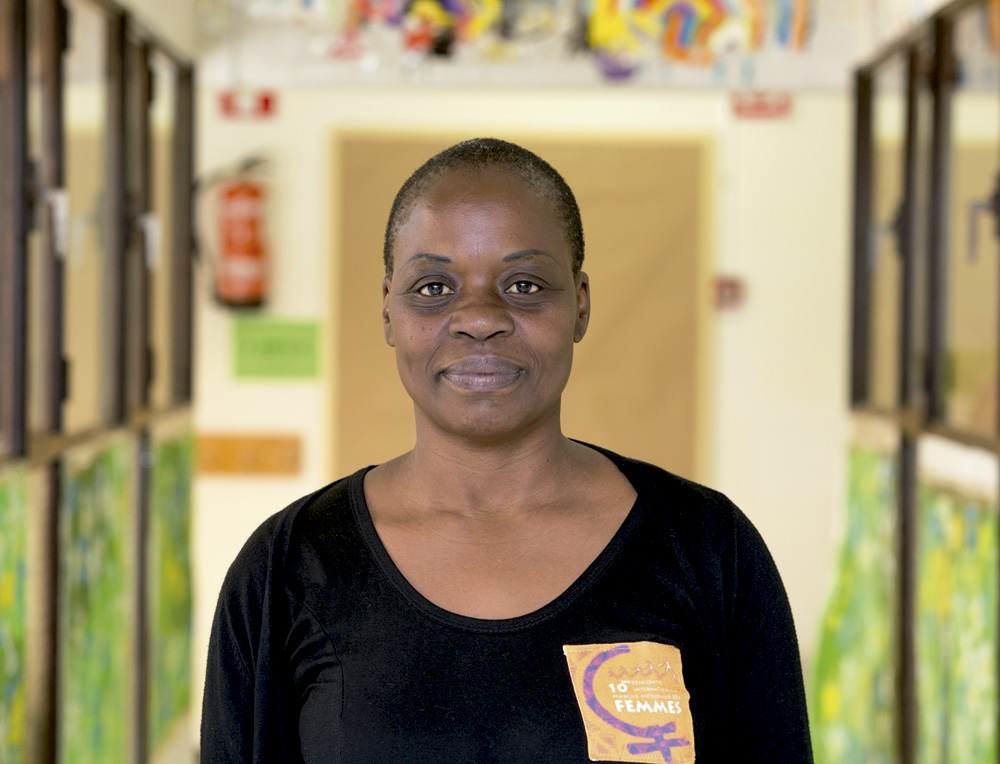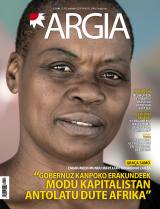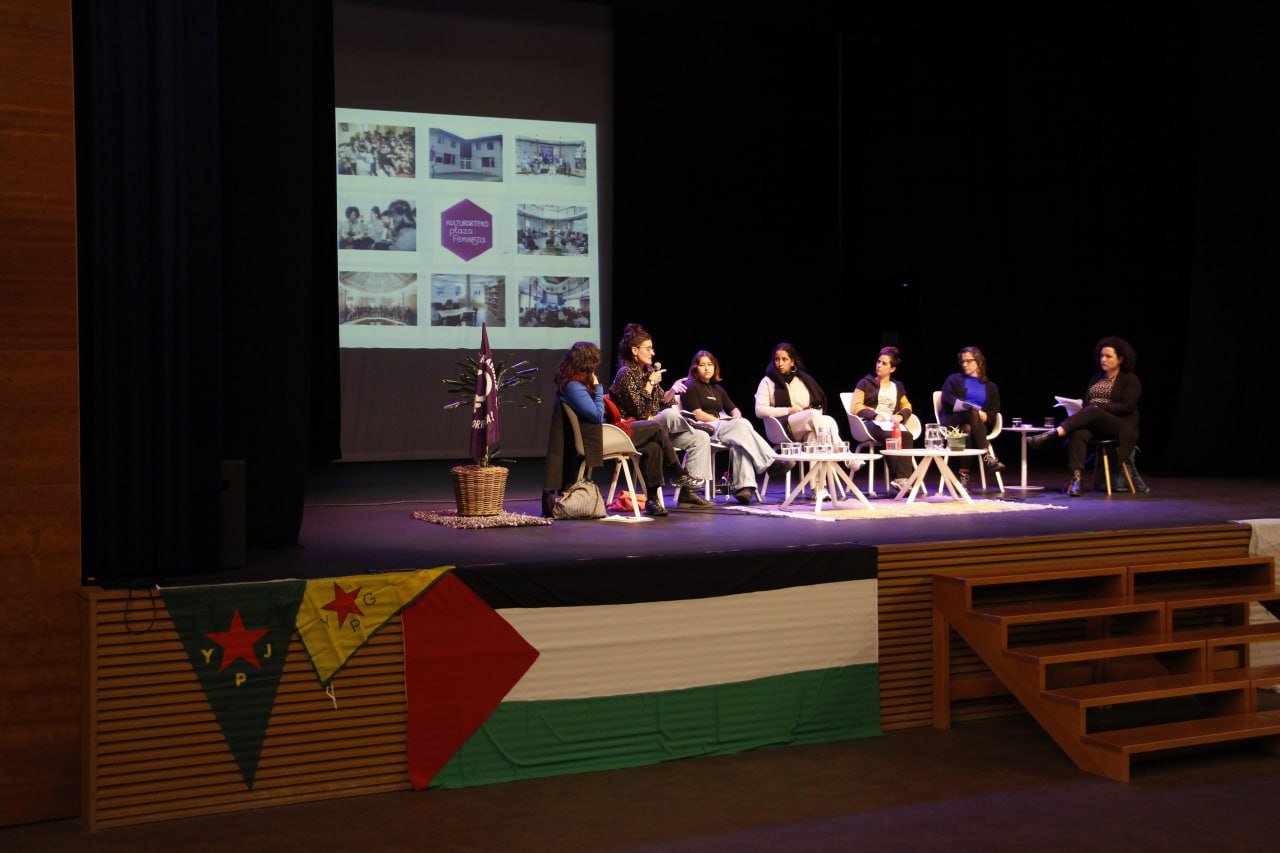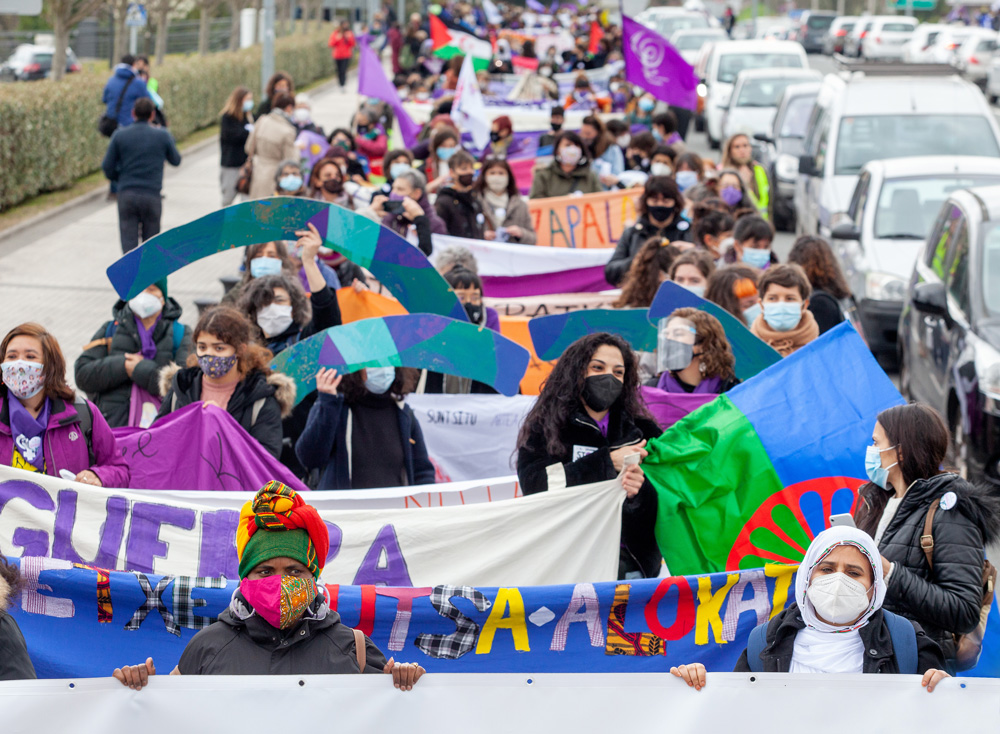"All women have to rebel, not just some."
- There is an international movement that accepts all peoples who define themselves as such. A movement, in which Québec, Mozambique and Kurdistan belong to the same level. This movement works and comes in the same name. World Women's March (EMM). A month ago she came to Euskal Herria Graça Samo, coordinator of the international secretariat of the movement, and we talked to him at the meetings that Bilgune Feminista organized on May 6. He clearly told us: “We will keep going until all women are free.”

Enpresa ikasketak egin zituen jaioterrian, eta tokiko garapenari eta generoari buruzkoak, berriz, Brasilen. Forum Mulher erakundea zuzendu zuen hamar urtez, eta 2013az geroztik, Emakumeen Mundu Martxako nazioarteko idazkaritza koordinatzen du. Maputon bizi da, eta irakasle dabil Mozambikeko Unibertsitate Politeknikoan, Administrazio, Zientzia eta Teknologiako Sailean.
How did it begin in social and political militancy?
When I was younger, I started in the student movement, and once the studies were finished, I worked in a number of NGOs. We were in Mozambique during the civil war, so I devoted myself mainly to emergency situations. Then I was in Angola, where they were also in civil war. Then I went to Brazil to continue studying and did social work in several favelas.
And when did you start with feminist militancy?
In 2004, I returned to Mozambique and then joined an organization dedicated to women’s rights and gender issues, Forum Mulher. So I met the women's struggles very closely. In Mozambique, at that time, there was no feminist movement in that direction. There were academic feminists, but many were white, and it was hard to find Mozambican women who believed themselves to be feminists.
What path did he follow in that institution?
I worked as a director for ten years, and my goal was to change things a little bit and make the organization more radical. As I had already studied business, I wanted to achieve concrete goals. For example, while I was working in the organization, we tried to influence public policies in Mozambique, and among other things, we managed to get a law on domestic violence against women passed and another to offer safe and free abortion. In 2013 I was offered to join the international EMM secretariat, and for a year I worked on two jobs, but it was too much, and in 2014 I left Forum Mulher to dedicate myself fully to the EMM.
What is the current situation in Mozambique?
We seem to have woken up to a dream. Mozambique gained independence in 1975 and a socialist, almost communist government was established. All the properties of the colony were nationalized: houses, lands, companies, etc. In addition, resources were redistributed, access to education was facilitated…
However, a year later, in 1976, a civil war began that lasted until 1992. We were convinced that the real revolution would then begin, which was the time to really start developing our country, but nothing else to abandon arms, the free trade agreements came in and an automatic transition to neoliberalism began. Instead of improving people’s lives, it got worse, because, while the war lasted, we live on what was built by socialism, but now…
The majority of our country ' s population lives in rural areas and it is precisely where multinational companies go; the people living in these areas have little information and are much more vulnerable to foreign companies.

How does the arrival of multinationals affect women?
As a result of free trade agreements, women have lost their land and their jobs; on the other hand, despite having a job, it is always of very low quality because of the level of schooling. On the other hand, violence against women has multiplied in recent hours. The debate is over and over again, to see whether violence has actually grown, or whether the media is talking more about it. In my opinion, it is actually growing.
Why?
The government has militarized very much in the last two or three years, they have assembled from top to bottom, and every time the social movements want to organize something, even the first of May, the military tanks and the robocop men leave... Fear and insecurity are ahead. If the government does that in the public sector, what will happen in the private sector? Violence is reproduced. Violence crosses Mozambican society.
Examples?
In fact, last year there were two tremendous cases. The daughter of the lehendakari, who ruled until 2014, was shot dead by her husband on 14 December 2014. And three months earlier, Graça and Samora Machel, the daughter of leaders and politicians of our revolution, got a brutal beating from their partner and got an eye on him. Think about the messages that normal women get, when these things happen to these public figures.
How is it being organised in the face of this growing violence?
Well, for us, EMM has been a great opportunity, because we've changed our vision. We initially thought that violence was going to end if we got a law against it, and at that time, in the 2000s, we gave our best conditions to get that kind of law. But then we realized that they didn't work for much; besides, the laws that you've just passed have nothing to do with what we've proposed, they take away all of their content.
On the other hand, in the case of the abortion law, it has been approved, but many women still die because of clandestine abortions, because women and girls who abort are highly stigmatized in society and therefore do not go easily to public hospitals. Therefore, we are now working on the conscience and power of women to understand that violence is structural and that they have to face guilt.
Do you have any relationship with other social movements?
Africa is the continent that suffers most from the attacks of neoliberalism and yet social movements are more vulnerable in Africa. Why? Because the NGO fever has hit Africa especially. This structure and the international financial mechanisms completely destroyed the old Community networks, the branches of NGOs picked up everything and organised it in a very capitalist way. Europe and the United States remain convinced that they will save Africa, with this colonialist discourse on development, boosting investment and humanitarian aid, but that only increases dependence and debt.
“Africa is the continent that is hardest hit by neo-liberalism and yet in Africa social movements are weaker. Why? Because the NGO fever especially attacked Africa.”
He spoke at the feminist meetings of Basque women and stressed the importance of the anti-colonialist struggle.
Yes, it is important that you mention it here. The women of the Global South are working on our vision, on our awareness, but you also have to reflect on the subject, globalization was launched and all those companies have to review the relations that the people of the countries to come are building with the South. We refer to consumption, for example. How is consumption encouraged here, who is paying the price of cheap consumption here? When you buy a jacket in a mango store for 10 or 20 euros, why is it so cheap? Because a woman from the global South has paid that price, she has worked as a slave, without rest or decent working conditions. Or, if not, where does our light come from, our electrical energy? We know that hydropower companies, for example, destroy communities. We have to talk and reflect on all of these problems, because we all have to rebel, not just some.
How did the World Women's March come about?
The World Women's March is an international feminist, anti-patriarchal, anti-capitalist and anti-colonialist movement. It began in the 1990s. The Quebec Women ' s Federation organized a march to increase poverty and violence against women. They achieved great success so that in 1998 an international call was launched, which was answered by many countries and that in 2000 the first global action took place. At that time it was intended to combat neoliberalism and privatization, which affected the entire global south but also the working class of the north. Following this 2000 action, the movement met and decided that the struggle could not be interrupted, that it should be durable.

Why?
Because it was a struggle against a structure and a system, and that structure manifests itself in various ways, depending on the place. In addition, after this first action, women claimed and proposed various things, the achievement of which should have an impact on the public policies and laws of the countries, in order to change things at the root and in a lasting manner. To do so, women had to continue learning, analyzing the context over and over again, identifying oppressions and working on ways to combat them.
If I am not mistaken, one of the symbols of the EMM is the result of the action of the year 2000.
Yes, it was then that we created the “Women’s Charter for Humanity”. Women wrote letters to their Governments and to the United Nations, informing them of local demands and calling for changes, and with them we built that general letter.
On the other hand, in 2005 we carried out our second global action and women stitched a quilt. Each village knit a square meter using the technique they wanted. They took part in 30 villages and formed their backdrop. Then they took over his piece and headed to the next town to sew the pieces. That is the other symbol of the EMM, the mattress of solidarity.
In the 2010 action, you didn't walk from people to people.
We had realized that war and militarism have a huge influence on women's lives. On the one hand, there is military power, that would be the clearest symptom, but women also suffer militarism in other ways, through the hierarchical structures of institutions and other hierarchies; for example, we are frightened, we stay at home standing still and silent, without fighting violence. At that time, the Democratic Republic of the Congo was declared the worst place for the lives of women, for the existence of great violence and for the rape of women by military and paramilitary forces. In Kibu, therefore, we gathered more than 10,000 women in solidarity.
Two years ago you took the last action, in 2015.
Yes, on that occasion, we wanted to emphasize that, although women live in independent territorial theories, the dams are the patriarchal structure and the neoliberal capitalist economic model that governments have imposed on us. In addition, transnational corporations are dominating our territories and an education has been imposed that says that what comes from outside is better and that people are not accepted as it is, that they always want to change this or the other. So we demanded that we keep going until our bodies and territories were released, and each people tackled local problems, and they worked on the resistance and the alternatives to deal with them.
How do permanent and global action, the international movement and local organization combine?
Local groups are at the heart of the EMM, we call them national coordinators, and it is their responsibility to mobilise the members of their territory and to build the necessary alliances to carry out their struggles. Then, each coordination chooses two persons participating in the international committee. The Commission holds international meetings every two years, and that is where it decides what actions the EMM is going to organise. These meetings are the most political time for the EMM. We brought together the representatives of all the peoples who make up the EMM, each presented its agenda and in the plenary assembly defined a common agenda. We intend to organize the next meeting in Euskal Herria.
Mugimendu anti-kolonialista da Emakumeen Mundu Martxa, eta pentsamendua deskolonializatu beharra azpimarratu du Samok, adibidez, garapenaren harira: “Gure herrialde eta nazioak garatzeaz ari garenean, zertaz ari gara? Mendebaldeak bilatu zuen garapen berbera daukagu buruan, hegoaldea kolonizatu zuena, kapitalismoa bultzatu, eta jendea esklabotzara behartu? Ez dugu hori nahi, beraz pentsatu behar dugu nolako garapena izango den gurea, inori lapurtu gabe, natura suntsitu gabe eta jendea esplotatu gabe. Bide luzea da”.























